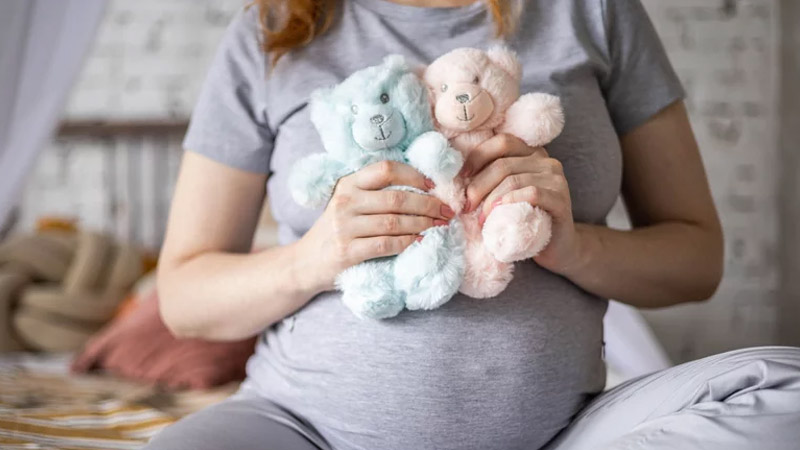
Early Signs You Could Be Pregnant With Twins
Share0Becoming pregnant with twins is a double blessing for many couples. You may anticipate the joy of raising two children who inevitably share every milestone, have the closest sibling bonds, and will never lack a playmate (via Baby Centre). But being pregnant with two can come as a surprise.
And it does come with some challenges and risks (via Johns Hopkins Medicine). Premature births (before 37 weeks) occur in 60% of twin pregnancies. This often comes with low birth weights and as a result, sometimes in the NICU (neonatal intensive care unit).
There is also a risk of anemia, high blood pressure, and miscarriage. And, there is a phenomenon known as a twin-vanishing syndrome, in which there is more than one fetus at the beginning of the pregnancy, but one miscarries (or vanishes) within the first trimester. That said, early and consistent prenatal care can increase the chances of a safe and healthy twin pregnancy (via WebMD).
While it’s impossible to be certain you’re pregnant with twins until your first-trimester ultrasound (via What to Expect), there may be some early signs you could be pregnant with twins (via BabyCenter).
Elevated hCG levels
Human chorionic gonadotropin (hCG) is a hormone produced in the placenta to support a growing embryo (via Cleveland Clinic). It can be detected in both urine and blood 10 to 11 days post-conception and reaches its peak level toward the end of the first trimester.
If your levels are detectable, two pink lines will appear on your home pregnancy test. Once a pregnancy has been confirmed, your doctor may order a blood test to further analyze your hCG levels and determine the status of your pregnancy and fetal development.
A study published in the Journal of Perinatal Medicine shows that women who are pregnant with twins have higher hCG levels than women who are expecting just one baby (via Doulas of Orange County).
However, because hCG values are variable depending on the person and the pregnancy, a high hCG a not a definitive sign you will be having twins. Ultimately, only an ultrasound can visibly determine if you are having multiple pregnancies — be it twins, triplets, or more (via Today’s Parent).
High levels of alpha-fetoprotein
Alpha-fetoprotein (AFP) is what it sounds like — a fetal protein. It’s made by a fetus’s liver and yolk sac (via Medline Plus). Higher levels of alpha-fetoprotein have been associated with twin pregnancies. According to a 2016 study in Biomedical Reports, the levels of alpha-fetoprotein were twice as high in twin pregnancies as compared to singleton pregnancies during weeks 16 and 17.
All pregnant women should consider an AFP screening to detect any potential for abnormality in the pregnancy (via American Pregnancy Association). This test does not determine a diagnosis but rather signifies if further testing is necessary.
Abnormal AFP levels are associated with various conditions such as neural tube defects and Down syndrome, as well as twin pregnancies. That said, the most common reason for high levels may be an inaccurate dating of the pregnancy. This is because AFP levels heighten, plateau, and decline at specific weeks during a pregnancy (via Labpedia.net).
Women who are 35 or older, who have a family history of birth defects, or who’ve used drugs during the pregnancy that may be of potential harm are especially encouraged to get an alpha-fetoprotein screening.
Extreme fatigue
Falling asleep during a movie when you’re expecting is one thing, but if you’re experiencing next-level exhaustion early on in your pregnancy, it may be a sign of something unexpected (via What to Expect). For one thing, higher levels of the hormone progesterone and an elevated basal metabolic rate — this is the rate at which your body is burning calories just to sustain basic function (per Garnet Health) — may contribute to the exhaustion in a twin (or multiple) pregnancies (via Doulas of Orange County).
Twin pregnancies also place greater demands on the body and can deplete its supply of iron in the blood — and that may lead to anemia (via The Bump). Without enough iron, your body can’t produce enough hemoglobin to carry sufficient oxygen through your body (via Mayo Clinic).
Thus, iron deficiency can make you feel fatigued and out of breath. Anemia during pregnancy can be detrimental to the health of both the mother and her fetus, so if you’re concerned you may be anemic, be sure to contact your doctor (via WebMD). They may recommend a supplement to boost your iron levels. – healthdigest
